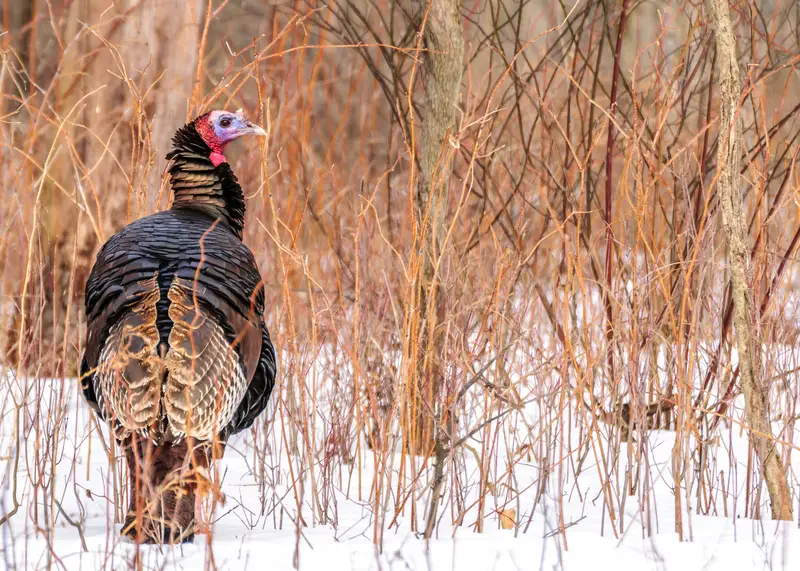
When it comes to turkey hunting out west, the weather is a huge factor all hunters have to face. Anywhere in or near the rocky mountains has some unpredictable weather due to dramatic elevation changes and weather patterns. So understanding how to make sense out of spring weather and its effects on turkey hunting is of the utmost importance.
How a turkey will react to weather is still up to the individual turkey but we can make some general assumptions based on past in-the-field experiences and observations. Turkeys tend to react to certain weather patterns in rather consistent ways but this may change in your specific area. Here are some things to consider when faced with some common weather conditions.
Wind
Turkeys are prey, and they know it. Their self-preservation largely depends on their eyesight followed by their hearing capabilities. When it is windy, the turkeys are very wary of going out from a roosting position because they can’t detect prey when the trees and brush are moving all around them. So they will likely wait to come down from a roosting position until there is a break in the windy weather.
This is where you come in.
The best tactic you can use when it is extremely windy is to wait it out. The turkeys are waiting for a break in the weather, and you should be also. There is only one caveat, and that is if you are on a mountain hunting turkeys, you may want to go to a lower elevation position on the mountain that shields the turkeys from the wind.
The turkeys may have moved to such an area to avoid the weather. Open areas such as a meadow at the bottom of a draw may be a good location for repositioning. So if this scenario is available, you should try it out.
When it comes to calls, you will want to try starting out soft and gentle to see if there are any turkeys in the immediate area and then gradually increase calls to higher volumes to try and cut through high winds.
Rain
The rain is the worst condition for turkey hunting. Unlike waterfowl, turkeys hate the rain just as much as hunters due. Their feathers don’t fare well with the water and they would rather avoid it. So similar to dealing with the wind, a good way to handle this scenario is to wait for a break.
Crank up that Alan Jackson, and drink a cup of coffee, because when the rain starts to let up, those turkeys will be looking to make up for lost time both in mating and feeding activity. Again look for open areas where the turkeys will go to get out from the water that is still dripping from the trees, to dry out their feathers.
Another consideration here is keeping your calls dry. Calls like box calls which are made of wood, may start to expand and get ruined if they are exposed to wet conditions so it may be best to stick with diaphragm calls for rainy days. If you want to carry a box or diaphragm call just in case it warms up later, then keep them in a waterproof bag until such conditions are available.
Snow
Like all the weather conditions mentioned so far, it depends on how much of that weather condition you are facing. If it is just a little rain or wind, then it may not have a huge effect on turkey activity. The same is true for snow. Is it a light snow? Could a turkey walk through it?
Think like a turkey. If I was turkey could I walk through this snow? If so, then the snow may be no obstacle for the birds. Especially if they are in areas where they are used to the snow such as higher elevations in the mountains.
If you in a more desert area in the southwest, then a light snowfall may jam up bird activity for a while. Also, keep in mind how old the snow is. If it has been snowing for the past couple of days, then maybe the snow has crusted and birds can easily walk on top of the snow. So just keep in mind that the turkey has to be able to walk to you. If that seems feasible, then try out some calling. If not, then wait until it clears up and find those open areas.
Fog
While fog is no obstacle to walk through, it may make the turkeys wary since they can’t see very well. So the first tactic is to wait until the fog lifts. However, you may be able to use this time to sneak closer to roosting areas if you already know where they are. If not, you can walk down a logging road utilizing some locator calls to see if the turkeys are interested. That when the weather lifts, you are in a prime position for a setup.
Determining what a turkey will due in inclement weather, is always a situation to closely monitor. One thing is for sure, you can’t kill a turkey from your bed. Being out there and waiting for opportunity to come knocking is what will separate you from other hunters. Keep in mind that weather or no weather, turkeys still have to eat and mate, so this will happen, you just need to be there when they feel so inclined.
If you enjoyed this article, check out these other articles from Pinetreesandsolitude.com:
- 3 Tips For Hunting Western Turkeys
- Where To Find Turkeys: Tips For This Season
- What’s The Best Turkey Call? Top Picks
(This article was originally published on Pintreesandsolitude.com. If it is now published on any other site, it was done without permission from the copyright owner.)
